Adjusting Our View of Chance or Choice?
**Spoiler Alert**
Chance or choice? Fate or free will? Which is it?
This oft-debated question gets top billing in the upcoming sci-fi/thriller The Adjustment Bureau(release date March 4), and moviegoers will leave theatres not only mulling over where they parked but if that parking spot were predetermined for them.
Lead character David Norris, played by the archetypal everyman Matt Damon, wasn’t supposed to catch the early bus to work. He wasn’t supposed to reconnect with the girl of his dreams, Elise (Emily Blunt). But he did. And in doing so he uncovers a world he wasn’t supposed to know exists. A world where caseworkers, as they refer to themselves, are there to ensure he adheres to the path set out for him by the Chairman.
Should a person fall off course, caseworkers step in to nudge the unsuspecting person back in to place. In some cases, they explain, misplaced keys and spilled coffee aren’t always a matter of chance. Sometimes it’s them recalibrating people back on course. (If this were the case, my coffee-stained documents would confirm that I am in need of frequent adjustment.)
David’s path doesn’t include him falling in love with Elise. But love, as it usually does, motivates great risk. So, refusing to “settle for less,” David attempts to outrun fate and fight for love and freedom. The question then arises: What determines one’s path—chance, choice, or the Chairman?
Philosopher/theologian Kenneth Samples explains this controversial topic in a 5-part series on thinking about ethics:
The question of human free will is a hotly contested issue in both philosophy and theology. Some philosophers grant humans a liberty of the will and insist that morality is impossible without it. Others insist on some form of determinism (all acts result from prior causes). Still others embrace what amounts to a form of fatalism (either materialistic or theological in nature).
Within historic Christianity there has existed a healthy debate through the centuries over the freedom of the will. Some have sought to maximize human freedom (libertarian free will). Others have argued for compatibility between God’s sovereignty on one hand and man’s responsibility on the other. Clearly, ethical considerations are closely connected to one’s view of man’s nature and will.
So what take does the film offer? On the surface, it seems to imply that the Chairman merely reacted to David’s choices. Yet subtle clues appear each time David takes another step down the “untraced” path, hinting that the Chairman knew all along which path he would follow.
In the end, the caseworkers offer this preface: “Only the Chairman knows the plan. We only see part of it.”
The “part of it” we can all see in this film reminds us of the constant human effort to understand the nature of God and resolve age-old philosophical debates. Even though many deny him, they cannot help but try to capture his essence through the arts. We can applaud such works and use them as springboards for discussion.
For example, this “Chairman” doesn’t compare to the omnibenevolent God spoken of in the doxology in Romans 11:33: “Oh, the depth of the riches of the wisdom andknowledge of God! How unsearchable his judgments, and his paths beyond tracing out!”
What’s your take on free will, determinism, and God’s sovereignty?
–Sandra






